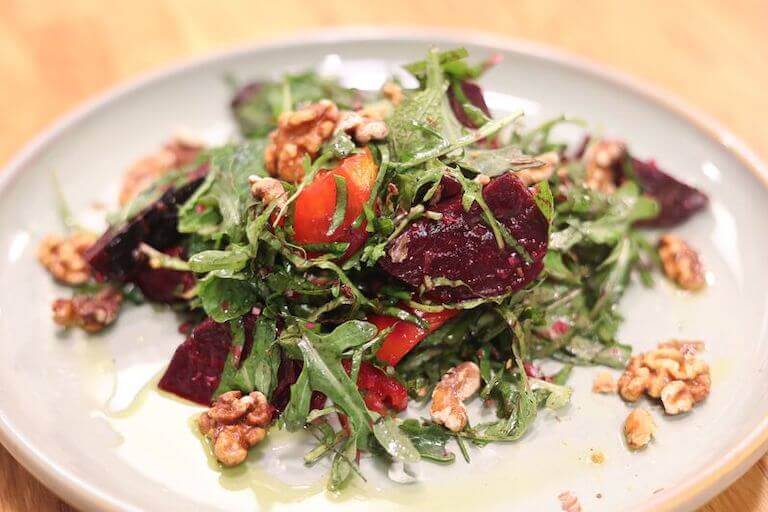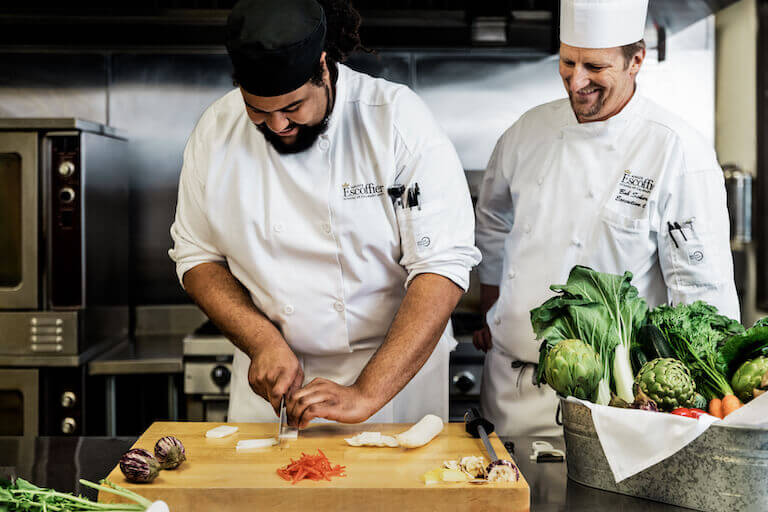The term “plant-based” has become a major buzzword in the food industry in recent years–whereas in the past, the idea of a strictly vegan or vegetarian diet may have seemed inaccessible to many. However, thanks to plant-based meat substitutes, countless consumers now feel more confident in eliminating meat or reducing animal products in favor of plant-based diets. In fact, Datassential’s 2023 Food Trends report indicates that 40% of consumers plan to purchase plant-based meat products this year.
But what is plant-based and does it require going 100% vegan or vegetarian? Is this type of diet right for you? Here’s our essential plant-based guide, which includes tips for getting started on your plant-based diet journey.
What Is a Plant-Based Diet?
The good news about plant-based eating is that there’s no one-size-fits-all approach. Based on your individual needs and preferences, you can incorporate variations of a plant-based diet into your lifestyle.
Veganism and Vegetarianism
Those who eat plant-based diets might choose to be strictly vegan—meaning that they consume no animal products whatsoever—including meat, fish, eggs, dairy, or even honey. Often, people who identify as vegans also make efforts to eliminate other animal products in their lives, like abstaining from wearing leather and using items that include animal byproducts or have been tested on animals.
A vegetarian diet can also be considered plant-based, as it incorporates fruits and veggies as primary staples. But whereas vegetarians eliminate meat from their diets, they might include some animal byproducts, like eggs, dairy products, or honey.
Plant-Heavy Diets
The “plant-based” label can also refer to diets that reduce animal products without eliminating them altogether. For example, the whole foods diet (also known as Whole-Foods, Plant-Based, or WFPB) and its variations include many of the elements of a vegan or vegetarian diet, with a focus on “clean” or minimally processed foods.
Essential Plant-Based Diet Food Groups
- Fruits: Common fruits in plant-based diets include apples, bananas, strawberries, and oranges—perfect to include in nutritious breakfasts and desserts, and rich in antioxidants.
- Vegetables: Loaded with vitamins and fiber, veggies such as broccoli, spinach, carrots, cucumbers, kale, and cauliflower may help keep you full for hours on end.
- Legumes: Beans and lentils make an excellent source of protein, provide fiber, and also contain a healthy dose of vitamins and minerals.
- Whole Grains: For plant-based diets, whole grains such as oats, barley, quinoa, and buckwheat can provide a hearty “base” for any meal, can be paired with legumes to provide complete protein sources, and can support cholesterol levels.
- Nuts and Seeds: Another essential protein and fiber source are nuts and seeds, which include Omega 3 fatty acids. Consider almonds, walnuts, chia seeds, flax seeds, and more.
The Mediterranean diet has a strong emphasis on fruits and vegetables but includes animal products like fish and cheeses a few times a week. Typically, dairy should be fermented and consumed in smaller amounts. Eggs and poultry might be included occasionally, but they’re not a regular part of the Mediterranean diet. The bottom line is that you can choose to reduce your animal product consumption or start exploring plant-based culinary techniques without necessarily giving up meat or dairy.
“I decided to enroll in the Escoffier Plant-based Culinary Arts program at age 60 and am so happy I did. From day one, learning how to hold my knife correctly was a major game changer. I was given the opportunity to do ‘Vegan Tuesdays’ at the restaurant where I did my externship, bringing in my own crew. Age is not a deal breaker, it is a blessing.”*
Jeanette Rideau, Escoffier Online Plant-Based Culinary Arts Graduate
The Many Benefits of a Plant-Based Diet
When it comes to plant-based eating, there are countless benefits for the individual, the environment, and the world at large. According to the Columbia University Irving Medical Center, plant-based diets are healthy and can meet all of your nutrient needs. Not only can plant-based diets reduce the risk of issues like heart disease, hypertension, high cholesterol, and diabetes, but they could prevent obesity as well.
“The world needs to know how good plant-based is. We need more people who understand where the carnivores are coming from, and welcome them into the world of a ‘Meatless Monday.’”*
Shane Witters Hicks, Escoffier Boulder Graduate & Private Chef/Educator, The Soulful Spread
Environmentally, plant-based diets are a more sustainable option than diets that include animal products. According to the National Library of Medicine, “the move to more plant-based eating (can possibly) reduce diet-related land use by 76%, diet-related greenhouse gas emissions by 49%, eutrophication by 49%, and green and blue water use by 21% and 14%, respectively, while garnering substantial health co-benefits.”
Ethically speaking, diets that drastically reduce or completely eliminate animal products can contribute to decreasing animal exploitation and cruelty in the agricultural industry—from caging and slaughtering to factory farming.
The Positive Impact of Plant-Based Diets:
- Studies from Harvard University concluded that diets high in plant-based foods may lower overall stroke risk by up to 10%.
- According to PNAS, transitioning toward more plant-based diets could reduce global mortality by 6–10%.
- According to World Animal Protection, nearly 1 million animals were saved in 2022 due to restaurants chains and large grocery stores offering more plant-based products.
Debunking Plant-Based Diet Myths
Often, people think incorporating a plant-based diet means going strictly vegan or vegetarian. But you can alter your diet to include more plant-based options without giving up animal products altogether. Besides the Whole-Foods, Plant-Based, and Mediterranean diets we discussed above, choices like the semi-vegetarian, pescatarian, or flexitarian diets can keep your options more open.

Fresh plant-based beet salad that fits into a vegetarian diet.
You may have heard of potential vitamin deficiencies with a plant-based diet, but there are ways you can avoid these issues. The primary nutritional elements to be aware of incorporating into your diet are vitamin B12, iron, calcium, and zinc. Not getting enough of these could lead to issues like anemia and osteoporosis. Finding plant-based sources of these, if possible, may keep your body properly fueled with all necessary nutrients. To maintain a healthy lifestyle that best suits you, consult with a medical professional, such as a dietician, who may also support your goals.
An equally untrue misconception is that vegan or vegetarian diets are inherently healthy. There are plenty of foods that are technically labeled vegan or vegetarian-friendly, yet are loaded with ingredients like sodium, sugar, and saturated fat. It’s typically best to avoid copious amounts of processed foods and unnecessary additives, regardless of whether you’re following a plant-based lifestyle or not.
And if you’re concerned that a plant-based diet means you’ll use the same ingredients over and over and get bored quickly, don’t worry. Finding and trying various substitutes for animal products is a creative, exploratory process that allows you to broaden your horizons with cooking.
Listen to The Ultimate Dish Podcast “Plant-Based” Episodes:
- Why Plant-Based Food is the New Love Language
- From Pharmacy To Farmacy: Dr. Amy Sapola On Plant-Based Eating, Health, And Well-Being
- Chad Sarno: Why Plant-Based Eating Is Here To Stay
- Plantstrong CEO Rip Esselstyn: Not All Plant-Based Foods Are Created Equal
- Master Chef Ron Desantis Talks About Embracing Plant-Based Cooking
Tips for Starting a Plant-Based Lifestyle
When embarking on the journey of plant-based eating, you can start by making gradual changes to your existing diet. Many people choose to have one day a week (Meatless Mondays, for example) that’s dedicated to eating 100% plant-based meals or starting to use plant-based ingredient substitutes in their recipes. If you’re currently consuming a lot of animal products, gradual introductions to plant-based dishes can also help prepare your body for this transition.

Plant-based smoothies can be a fun and refreshing way to obtain essential nutrients.
If you’re attempting to go vegetarian or vegan, it’s important to identify meatless protein sources, like lentils and chickpeas, tofu and seitan, and nuts and seeds. Find ways to sprinkle these proteins into your meals, so that you can ensure you’re getting the necessary macronutrients your body needs.
“People are starting to play with the idea that there might be a better way of doing things than just the traditional meat and dairy way of cooking. They’re finding that more and more chefs around the world are playing with plant-based ingredients with more vegetables, and society is accepting it. And that’s the driver for the change.”*
Chef Shane Witters Hicks, Escoffier Boulder Graduate & Private Chef/Educator, The Soulful Spread
Just as important, be sure to get plenty of healthy fats and carbohydrates in your diet to avoid energy crashes. Fruits and veggies are great carbohydrate sources, but whole grains like farro, brown rice, wild rice, and millet are beneficial, too. Nut butters and plant-based oils (like avocado, coconut, or olive oil) are considered healthy sources of fat.
Monitor how you feel along the way. Keep a food journal and notice how different meals affect your body. For instance, some who go plant-based find that certain foods make them bloat, while other foods give them lots of mental clarity. Keep an eye on your sleep, energy levels, moods, and changes in any medical conditions you may have.

Escoffier student preparing a variety of veggie-based meals.
Turn Your Plant-Based Passion into a Career
If you’re looking for ways to take your plant-based passion to new heights, have you considered a career as a plant-based chef? Or can you envision yourself as a plant-based food truck owner, recipe developer, or private chef? If you’re interested in discovering ways to prepare vibrant plant-based meals for the masses, you might consider formal training from experts.
Auguste Escoffier School of Culinary Arts offers online and on-campus Plant-Based Culinary Arts programs taught by knowledgeable and credentialed Chef Instructors with extensive industry experience. Contact us today to learn about our plant-based course offerings and how you can build your knowledge of industry best practices in a flexible, interactive learning environment!
Was this article helpful? Check out these plant-based articles next:
- Plant-Based Classes: A Guide To Culinary School For Vegans And Vegetarians
- What Credentials Do You Need To Be A Plant-Based Chef?
- What Can You Learn In Plant-Based Culinary School?
This article was originally published on August 2, 2021, and has since been updated.
*Information may not reflect every student’s experience. Results and outcomes may be based on several factors, such as geographical region or previous experience.



